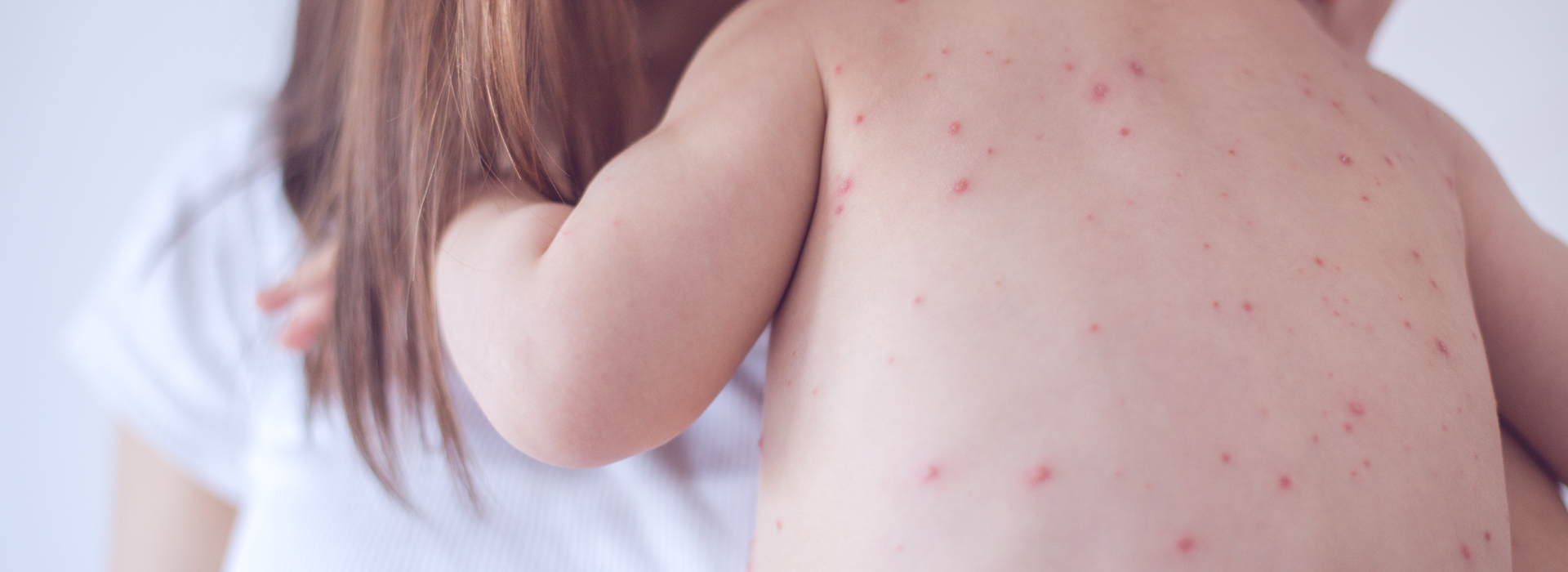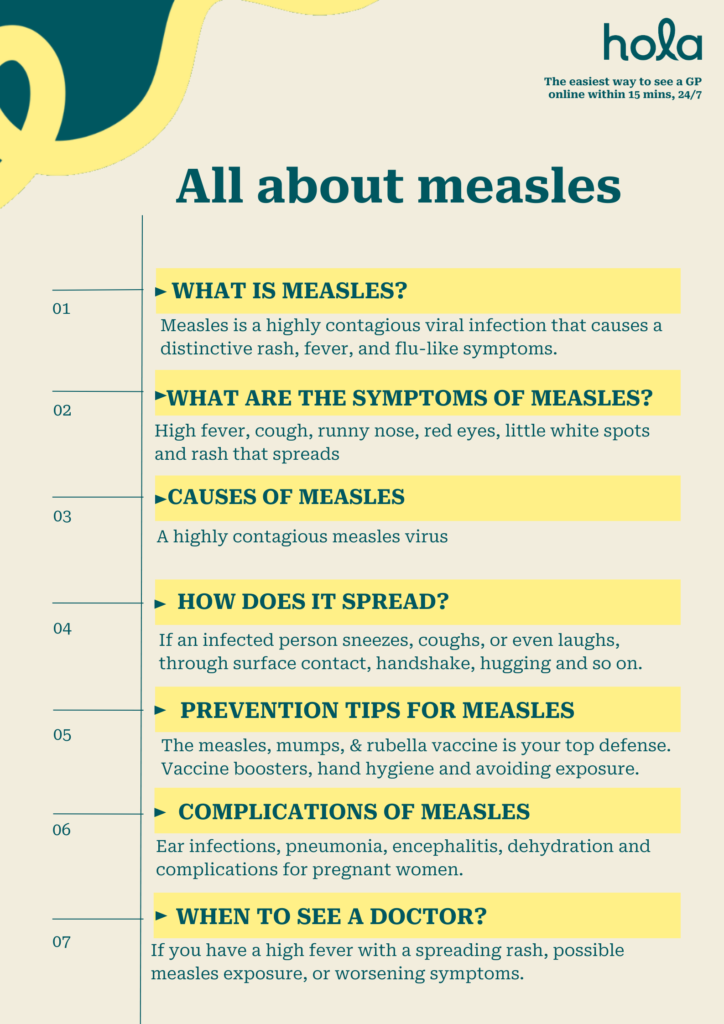Measles: Symptoms, how it spreads, when to call a GP
Written by Dr Nelson Lau, MBBS FRACGP, GP & Digital Health Specialist.

Contents

Summary
Measles is a highly contagious viral infection marked by fever, cough, red eyes, and a spreading rash. It spreads through airborne droplets and can linger in the air or on surfaces for hours. While there’s no specific cure, supportive care, rest, and isolation help recovery and prevent spread. Vaccination is the best protection, and telehealth offers a safe, convenient option for initial assessment and advice.What is measles?
Measles (sometimes called rubeola) is an infection caused by a sneaky virus that loves to hitch a ride in the air when someone coughs or sneezes. It’s notorious for its red, blotchy rash and for how easily it can spread way more contagious than a cold or flu. Think: if a person with measles walks into a room, the virus can lurk in the air for a couple of hours, waiting for someone else to breathe it in. Back in my day before vaccines, everyone got measles at some point. Now we have ways to prevent it, so it’s less common—but still very much around in places with lower vaccination rates.What are the symptoms of measles?
- High fever: Often the first big clue. We’re not talking a mild rise in temperature; it can jump pretty high (like 38.5-40°C).
- Cough, runny nose, red eyes: Early on, you might mistake measles for a nasty cold.
- Little white spots (Koplik Spots): These can appear on the inside of your cheeks—tiny dots that look like grains of salt.
- Rash that spreads: Usually starts on the face near the hairline and then heads south, covering the rest of the body. Appears a few days after the fever kicks in.
What causes measles?
A virus. Plain and simple. But not just any virus—the measles virus is unbelievably contagious. People without immunity (meaning they’ve never had measles before or aren’t vaccinated) can pick it up just by being in the same room as someone infected. That's how extremely contagious it is.How does measles spread?
- Airborne particles: If an infected person sneezes, coughs, or even laughs (yes, we rarely mention that, but it can happen), droplets carrying the virus can float around in the air.
- Lingering in a room: The virus can hang out on surfaces and in the air for up to two hours.
- Close contact: Shaking hands, hugging, or just being near someone with measles ups your chances of catching it if you’re not immune.
Experiencing these symptoms? Speak with a doctor within 15 minutes.
When should I call my GP?
- High fever + rash: If you see a rash that’s spreading from your face downward, and you have a significant fever, it’s worth a call.
- Exposure worries: If you find out you’ve been around someone who has measles, and you’re not sure about your immunity, ring your doctor to ask about next steps (like a possible booster or tests).
- Worsening symptoms: Don’t “tough it out” if your cough, fever, or breathing gets worse. Measles can lead to complications, especially in children and older adults.
How is measles diagnosed?
Usually, a GP can spot measles by noticing that combination of fever, rash, and Koplik spots. They might do a blood test or swab to confirm. If you suspect measles, call the clinic before showing up—sometimes they have special protocols to keep you from spreading it to other patients in the waiting room.How is measles treated?
- There’s no “kill the virus” medication: It’s mostly supportive care—rest, fluids, and meds to reduce fever (like paracetamol, if recommended).
- Vitamin A: In some cases, doctors suggest vitamin A supplements, especially for children who might be deficient.
- Stay isolated: If you have measles, please avoid large gatherings, school, or work until a GP says you’re past the contagious phase.
How can I prevent measles?
- Vaccination (MMR): The measles, mumps, and rubella vaccine is your top defense. Most people get it in childhood, but if you’re uncertain about your vaccination status, a quick blood test can check your immunity.
- Boosters: Sometimes recommended if you’re traveling to areas with more measles cases or if there’s an outbreak in your community.
- Hand hygiene & avoiding exposure: If there’s an outbreak, try to steer clear of crowded places, especially if you haven’t been vaccinated.
Complications of measles infection
- Ear infections: Very common in kids with measles.
- Pneumonia: The most frequent cause of serious illness (and even death) associated with measles.
- Encephalitis (Brain swelling): Rare but can happen, leading to long-term complications or worse.
- Other issues: Dehydration, or potential problems for pregnant folks (like preterm labour).

Will telehealth help?
If you suspect measles, but you’re feeling okay-ish, you might opt for a virtual appointment to avoid spreading anything in person. A GP or nurse practitioner on video can see the rash (if it’s visible) and ask about symptoms. They’ll tell you if you need an in-person exam or if you should just keep resting at home.BUT if your symptoms are severe (like you’re having trouble breathing, extremely high fever, confusion), go to a doctor or ER in person. Telehealth is a great tool, but it doesn’t replace hands-on care when things get serious.
Hola Health makes it easy to get fast, expert care for measles symptoms without visiting a clinic. If you or your child shows signs of measles such as high fever, cough, rash, or recent exposure, you can speak to an AHPRA-registered Australian doctor via video consult 24/7. The online GP can assess your symptoms, offer medical advice, recommend next steps (such as isolation or testing), and issue online scripts, medical certificates if needed. If your case requires further evaluation, they can also provide a referral to a specialist.
Final thoughts
Measles might sound old-fashioned, but it still pops up—often suddenly—where vaccination rates dip. If you see any concerning signs or think you’ve been exposed, don’t hesitate to ring your GP. Early attention can make a huge difference, both for your own health and for preventing a wider outbreak. Remember:- Fever + cough + red eyes + rash = Potential measles alert.
- Measles spreads quickly, so keep an eye on your friends and family if you suspect infection.
- Vaccination is your best shield.
- Telehealth is useful but not a replacement if you need urgent care.
What we treat
- Cough
- Nausea & vomiting
- Fever
- Hayfever
- Fatigue
- Sore throat
- Acne
- Hair loss
- Gout
- Eczema
- Rosacea
- Sunburn
- UTI
- Erectile dysfunction
- Contraception
- Morning sickness
- Morning after pill
- Prostate health
- Anxiety
- Depression
- Stress
- Grief & loss
- Antidepressants
- Premature ejaculation
- Asthma
- Blood pressure
- Blood thinners
- Diabetes
- Cholesterol
- Migraines & headaches
- Allergies
- Body ache
- Heartburn & reflux
- Sleep disorder
- Pain relief
- Gastro
Related Articles
Disclaimer
This blog is for general informational purposes only and does not indicate that Hola Health provides all treatments or preventive measures mentioned. It is not intended to be a substitute for professional medical advice. Always seek the guidance of your doctor or other qualified health professional with any questions you may have regarding your health or a medical condition. For emergencies please immediately contact 000. Any medical topics discussed are intended to educate, not to imply availability through Hola Health.

Get affordable healthcare on your terms, with quick access to qualified, Australian-registered telehealth doctors & health practitioners, 24/7, 365 days a year. No more searching for ‘doctors near me‘ – Hola connects you instantly.
Address: 79 St Georges Terrace, Perth WA 6000


Hola Health App
Get affordable healthcare on your terms, with quick access to qualified, Australian-registered telehealth doctors & health practitioners, 24/7, 365 days a year. No more searching for ‘doctors near me‘ – Hola connects you instantly.
Call 000 for emergency or urgent medical help.
Address: 79 St Georges Terrace, Perth WA 6000
© Hola Health, a brand of Packapill Pvt Ltd


 Facebook
Facebook  X
X  Copy Link
Copy Link











